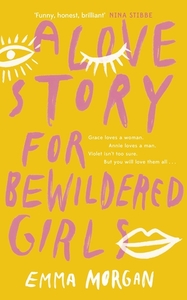Buy this from Bookshop.org to support local bookstores and the Lesbrary!
Your enjoyment of Cash Delgado Is Living the Dream will depend heavily on how you feel about reading hundreds of pages of a truly oblivious queer main character. The kind of character who googles, “Can you be straight and have a sex dream about your female best friend?” “Can you be straight and have sex dreams about a woman every night?” “Can you be straight and want to kiss a woman?” Personally, I had a lot of sympathy for Cash’s heteronormativity-poisoned brain, so I had a great time listening to the audiobook narrated by E. A. Castillo.
This is set in the same small town as Mejia’s 2023 bisexual F/M romance Sammy Espinoza’s Last Review and has some cameos of characters from that book, but I didn’t read the first book and didn’t feel like I was missing anything major, so you can definitely start with this one.
At 17, Cash Delgado shaved her head and joined a punk band, and then her controlling parents kicked her out. She thought she had a found family in the punk scene, but when she got pregnant, her support system (and the father) disappeared. She was on her own.
Since then, she’s built a life for herself by running Joyce’s Bar, a rundown bar that nevertheless is a community hub, especially on Karaoke Night. It isn’t glamorous, but the job comes with major perks, like free housing and health benefits. The hours are also flexible so that she can drop off and pick up her daughter Parker. (Parker also plays a fairly significant role in the book, and she’s an adorable six year old with a big personality.) Another big advantage of Joyce’s is working with her best friend, Inez.
Inez is the closest thing Cash has to family now, other than her daughter. She helps out with laundry and dishes when Cash falls behind. Parker adores her. Cash is so grateful for Inez’s support. Sometimes she worries that Inez is going to get a serious girlfriend one day and they won’t be as close, but she tries not to dwell on that.
We meet Cash as she faces two major shake-ups to her life. The last guy she slept with visits town, and when she goes on a date with him, he casually reveals he’s there to open a bar that will almost certainly drive Joyce’s out of business. After ditching him, she begins frantically trying to hatch a plan to save the bar, including trying to convince the out-of-town owners to pay to renovate. Of course, she and Inez work closely together to plan, which leads to the next shake-up: Cash has a… steamy dream about her best friend.
Cash reassures herself that this doesn’t necessarily mean anything, but she continues to have these dreams every night, and soon she can’t look at Inez without picturing them playing out. Even as her attraction to Inez becomes harder and harder to explain away, Cash worries about endangering their relationship. As you can imagine, this denial combines with miscommunication between Inez and Cash, causing the tension to just keep ratcheting up until the final chapters.
There were some aspects of this that didn’t land with me. For example, the ex turns out to be such a mustache-twirling homophobic villain that he felt cartoonish—though of course people like that do exist. On the other hand, Inez sometimes felt too good to be true, but she feels more realistic later in the novel. It was also hard for me personally to be too invested in fighting for a bar. Still, I found Cash’s obliviousness to her own queerness charming, and I felt for her, so I was invested in seeing how her and Inez’s story wrapped up.
If you’re a fan of friends-to-lovers romances, useless lesbians (affectionate), small town romances, single mom main characters, and coming out to yourself stories, I recommend this one, which comes out on July 2nd.


